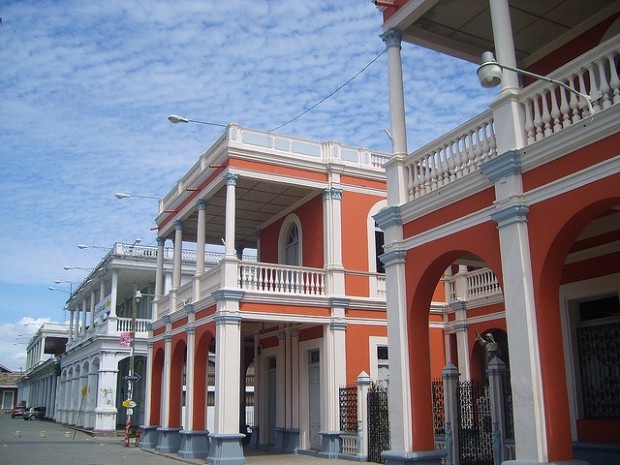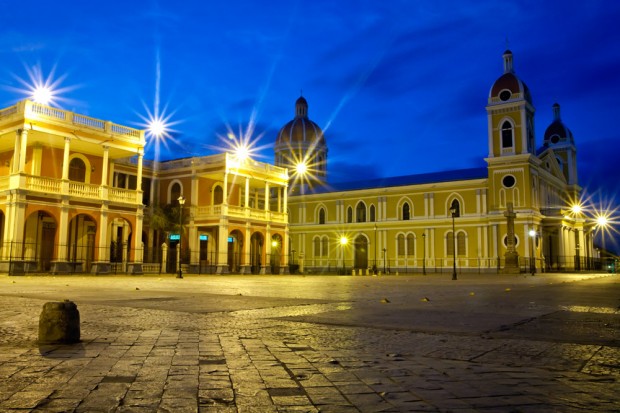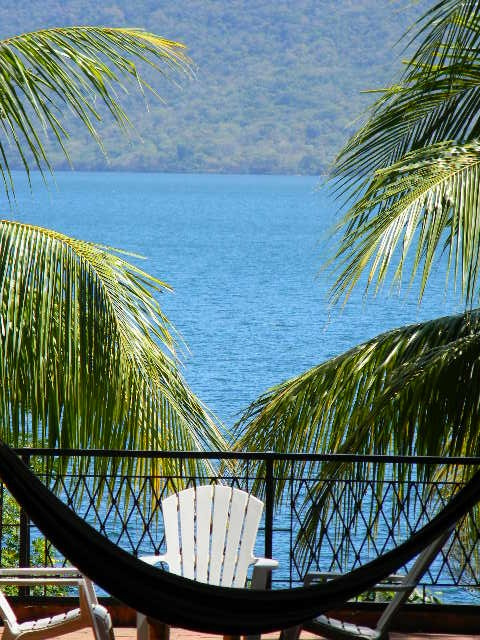
It was bound to happen. At some point, the elegant city of Granada would be discovered by a tourist trade, fascinated by the early colonial architecture settled tranquilly by the fitful waters of Cocibolca, with the dormant volcano, Mombacho, rearing triumphantly a few miles away. The idea of living in Granada would also attract a residency of expats and retirees, searching for their paradise, or just an escape from the political pressure and economic instability of their native countries.
The freshly painted buildings gleam next to the domed cathedral, the central plaza, the shaded park, the antique cannons reminding the visitor of an era of pirates and land struggles.
The streets seem nearly deserted. Late model cars line up in front of sheltering canopies, supported by equally freshly painted pillars, while a few pedestrians wander back from the market, woven shopping bags clinging to their arms.
Living in Granada: The Expat’s World
Inside the sedate buildings is a vigorous lifestyle. The post-preppie generation has moved in with coffee shops, health food stores, arts and crafts displays, sports equipment and gyms. As the day winds down, they come out to cluster around cafes and restaurants, with tables and chairs spilling out the doors and into the streets. They chatter about philosophy and politics, rising prices, places they’ve been and haven’t been yet, and sometimes, nothing at all.
Away from the decidedly middle to upper class central, there is a different life, a different beat. Traffic edges bumper to bumper, on rain-eroded pavement, competing with ox-carts, bicycles, and pedestrians for momentum in narrow avenues sliding by multi-colored concrete block store fronts and dwellings. Bright orange and yellow umbrellas hang over street stands loaded with hand prepared candies, freshly picked fruits and sea foods simmering in their juices. Hawkers demonstrate the wonders of plastic toys, carved bamboo flutes, incense, and religious candles.
Living in Granada is a choice between carrying your home with you, blending your expat life with dips in a private swimming pool and participation in the numerous Nicaraguan festivals, or immersing yourself completely in local culture. Typical of Central American countries, the poor set up homes in barrios and make-shift shacks next to the more affluent residents, the modern gas stations, video stores, and Internet cafes. There is no zoning committee. There is no careful separation of economic social classes offering shopping malls, theaters, and boutiques undisturbed by low-income housing.
Beyond the Hub
A walk down to the lakefront reveals a mother supervising her children on a rusting swing set. A little girl in a fluffy pink dress walks along a stone pier, bits of rock bubbling away into the dust from years of neglect. Under the banyan trees, their exposed roots bleached and twisted, a family peacefully picnics. An old man plays a xylophone, while at one end, a purple-headed parrot listens and sometimes bobs to the music.
In the evenings, the local community is alive with sound. Youths straddle their bikes like a motorcycle gang, although their ride is nothing more than a bicycle, and they’ve come to watch the show, not make trouble. The show is a set of musicians, one setting the beat with bongos, while Spanish guitars and trombones pick up the melody. A circle is cleared within the crowd, and four young boys demonstrate their break-dancing skills. The jugglers appear, one tossing around fire brands, another machetes, and yet a third, popping crystal balls from his arm muscles.
The town, so quiet, so unnoticed just a few years ago, now contains a modern supermarket. While expats fill their carts with favorite products from home, and examine the fresh produce, the locals walk through the aisles in awe. They remove a few boxes of crackers and cookies, shake them and sniff. Their fingers rove over the jars of spaghetti sauce, prepared Texas salsa, and catsup. They finally settle on a box of cereal and a few packages of maizena.
Their own outdoor market hums with the steady flow of brisk business. Folded tee-shirts, flounced little girl dresses on hangers, sexy women’s wear, plastic shoes and sandals threaten to burst from the confines of the tented shelters, while fruits, freshly caught fish, herbs and vegetables pile up in pyramids.

The Meeting of Cultures
The stark difference between local life in Granada and the newly found prosperity of Granada central doesn’t seem to bother the international community of retirees and expats. Some brag about their ability to exist on a three hundred dollar a month budget, by living in humble apartments, sacrificing air-conditioning and surrendering their Internet privileges to monitored time at a cyber-café. Others delight in their ability to afford maid service, dining out at restaurants three times a week, and cruising to Ometepe in a boat for the classic get-away-from-it-all.
There is however, a strong sense of volunteer service within the community. Although the country has been striving for a population-wide literacy program, the average native Nicaraguan has no more than a fourth to fifth grade education. The small sub-class of educators has stretched its resources. Many of the expats are committed to improving the quality of life for the friendly people who have welcomed them into their country, and have organized schools teaching both Spanish and English skills.
There is also an internal sense of community. Within the loose network of colonial home owners, expats gone local, rural back-to-earthers, and island hoppers, is a cyber-linked information center for showing newbies the ropes. The wired-in rookie can find apartments for rent, directions to legal counsel, tips for shopping places, activities, excursions, and places to hobnob with the crowd.
Choosing Your Rhythm
With so much diversity, it would seem there isn’t much any two people agree upon. Some state that the scaled- back, simpler life of Ometepe island is better than the quickly modernizing colonial hub. Some state renting a house among the local populace is too noisy, others claim it’s the magic touch for integrating into the populace.
Living in Granada, after all, is an explosion of sight and sound. It is music flooding from the streets and drifting from the windows of early morning risers. It is a party set up with amplifiers piled one on top of another, secured with bamboo poles, a tangle of wires leading to a heavy electric cable, while piñatas swing from the trees. It is long rolling months of hot, sunny days, relieved only by a rainy season, which usually begins in May and ends in December.
The rain brings its own music, tinkling on metal roof tops, sliding down garrets, tapping against windows and thudding against tent style canopies. For some, it’s a lull in the busy tourism industry, and they restlessly wait for the drier season. For others, it’s the eagerly waited moment when their carefully cultivated gardens begin to bloom and fresh greenery unfolds on the hillsides.
Making the Adjustment
For all the differences of opinion, there are some things the community of retirees and expats are agreed on. While Granada is incredibly beautiful, you should rent a place for a few months first before deciding it’s where you want to live. Although there are over a thousand expats living in the city, the numbers are lost among two hundred thousand residents. Its flavor, its color, its vibrancy is local.
For this reason, you should also learn to speak Spanish. While there are many English speakers, especially among businesses and services, Spanish is the dominant language. Without learning it, your options are limited, as well as your understanding of the people.
Granada not only has excellent medical care (though you might have to travel to Managua for it), it is cheap, with services that undercut even those of Mexico, Costa Rica, or Panama.
Granada is the place they settled on because it’s vibrant and alive. It’s filled with opportunities. It has a vision, multi-cultural and tolerant of new ideas, new customs, and diversified lifestyles. The freedom of expression that had once characterized American democracy and has become lost in bureaucratic red tape has been found again in Granada.
The Nicaragua 3 Count, where we bring you 3 Nicaragua stories that you shouldn’t miss.

Photo: Bialy
1. Granada: Here’s Why Expats Are Choosing this Colonial Gem
Granada is Nicaragua’s colonial gem. Many expats are calling this city home and for many good reasons. One couple’s reasons for choosing Granada goes well beyond its famous architecture and they say moving there was an emotional feeling more than anything rational.
2. Nicaragua Fast-Tracks Huge Canal Project
Nicaragua has dreamed of building a canal for hundreds of years. Now it is pursuing a plan to give a Chinese company exclusive rights to build the largest development project in Nicaraguan history. With little information and no public debate, the canal project was made public. Nicaraguans have no idea where the funding will come from, what the proposed canal route is, how long it would take to build, what the environmental toll would be, or even how much the project will cost.
3. Nicaragua’s Beaches Among the World’s Best
Nicaragua’s beaches on Little Corn Island are now ranked among the 100 best in the world. Located nearly 44 miles off Nicaragua’s Caribbean coast, Little Corn Island is approximate one square mile and known as being “low key, undeveloped and languid”, making it a perfect destination for tourist seeking a laid-back, relaxed vacation.

Retirement in Granada Nicaragua
For many of us, retiring overseas seems like a dream. Living out our twilight years in a new country sounds like an exotic adventure. It offers the chance to learn and experience new things, to get closer to nature, and to enjoy luxury at a much lower cost than at home.
Sadly, for most of us this dream is never realized. When it comes to the reality of moving overseas, we worry that it will be too expensive, too difficult, or too far from our family and friends.
This doesn’t have to be the case. Latin America is offering new and exciting opportunities for retirees to become expats. More and more people are flocking to the area every year, and it’s not hard to see why.
Nicaragua is becoming an increasingly attractive retirement location. The city of Granada is increasingly being described as one of the world’s best expat retirement locations.
Here are the five top reasons why you should retire to Granada, Nicaragua:
1. Granada is a beautiful, historic city with an awful lot to offer
Granada is a very popular city for expats for a number of reasons. It’s a stately, friendly city with great transport links and an interesting history. Property is also a brilliant draw for the city. Its Spanish colonial style homes are luxurious and affordable.

This year alone, 1.1 million tourists are expected to visit Granada, Nicaragua. They’re often drawn by the city’s picturesque cobbled streets and impressive historic churches. It’s also home to the Great Lake Cocibolca, which is one of the biggest lakes in the world. Imagine making a new life on the banks of the Great Lake, with the historic landmarks of the city just a stone’s throw away!
2. Nicaragua is a lot cheaper than you think
This life may sound idyllic, but it’s also within reach. If you have a retirement income of $20,000, you could make a very good life for yourself in the city. It’s estimated that living costs there are around $1,200 per month. For a more in depth look at how much it costs to retire to Granada, Nicaragua take a look at US News’ financial feature on the city.
3. It has great transport links
One of the huge benefits of retiring overseas is the opportunity it gives you to see more of the world. Nicaragua is well placed to visit nearby areas of Central and South America. If you’re concerned about being too far away from family and friends, you don’t need to be. The area is also only a two hour plane journey from Miami, which means that you’ll be able to enjoy regular visits to the States.
4. The weather is ideal
Many people choose to emigrate in their retirement in order to take advantage of some better weather! If that’s the case for you, Granada is a great choice. The weather in the city is great, and you can expect to enjoy temperatures in the 80s all year round. The lake the city is situated beside keeps a fresh breeze coming in, and makes sure that the city doesn’t reach the heat of other Nicaraguan cities.
The city also has a rainy season from May to October every year. During this time, there are thunderstorms every afternoon, which helps to keep the air fresh!
5. There’s a great expat community
It’s estimated that around 1000 expats live in Granada, and that the majority of those are retired. Though Granada has all the benefits of a big city, it also has much of the charm of a smaller community. The large expat community certainly helps: and you’ll find a wide range of clubs and activities waiting for your involvement.
One of the benefits of Granada is that it’s one of the safest places to live in Nicaragua. It’s a growing city, and it’s a very exciting place to be at the moment. In addition to the vibrant expat community, you’ll also be able to experience Nicaraguan culture first hand, and get a whole load of new experiences under your belt.
Thinking about making the move?
If you’re thinking about spending your retirement in Granada, Nicaragua, you don’t have to do it alone. There are professional companies on hand to help you get the best for your money, locate your new home, and get all the relevant paperwork completed.
Starting a new adventure in Nicaragua can be cheaper and easier than you think!

Joshua Berman
Living next door to tourism giant Costa Rica and the up-and-coming Panama, and due to the common misconception that Nicaragua is still unsafe for tourists, this little country hasn’t been receiving the attention it deserves when it comes to expats.
While it is true that Nicaragua has been getting more attention in recent years, having been featured on the covers of some travel magazines, Nicaragua remains one of Central America’s least visited countries.
But according to Jennifer Taylor-Jones, the Vice President of Product Development at JetSet Vacations, this somewhat forgotten Central American gem just might be stepping into the limelight.
Why Nicaragua?
As expats continue to look towards Central America as a possible place for retirement, many are searching for the next big thing, and in 2013, Nicaragua just might be that thing.
Tucked between Honduras to the north and Costa Rica to the south, Nicaragua was not always the expat friendly, land-of-plenty that it is today.
So what is it about Nicaragua today that is drawing expats in?
A sense of discovery
Many are coming to Nicaragua to get away from heavily tourist concentrated areas. They like the idea that Nicaragua is still relatively unknown and that it has not yet been pegged as a tourist hotspot, a definite negative attribute to those seeking peace and serenity.
The wonderful aspects of Nicaragua have not yet been revealed to the public on a global scale and in a way, it can be theirs to discover.
But although expats want to go somewhere new, they still want to go somewhere that is safe and expat friendly. Today, Nicaragua fits both criteria.
Why now?
In recent years, Nicaraguan officials have been nominating significant funds in attempt to attract North Americans to their country. The end goal is to make Nicaragua the third most visited country in Central America behind Costa Rica and Panama.
Much of this money will go towards helping outsiders learn more about Nicaragua by educating them on the country’s current political and economical state, factors that have made tourists and expats wary about Nicaragua in the past.
In fact, according to a report published by the Financial Times, Nicaragua ranked third after Montreal and Toronto in the category of Strategy for Attracting Foreign Direct Investment.
And changes are being made. One expat lived in Nicaragua in 2007, and during that time, claimed that the road connecting San Juan del Sur to the Pan American highway was nearly un-drivable due to massive potholes. When she returned on a recent visit, she was welcomed by a smooth stretch of maintained pavement in place of the ripped up road.
Aside from the improved roads, she was also pleasantly surprised to find internet access across the country and that the capital city of Managua had expanded into an urban metropolis with everything and anything an expat could possibly need.
So what can an expat coming to Nicaragua for the first time expect today?

san-juan-del-sur-psd photogrpahy
Perfect weather, beautiful beaches free of colossal resorts, towering volcanoes (including the still active Masaya volcano), Lake Nicaragua (the largest lake in Central America), surfing town San Juan del Sur, and colonial cities like Leon and Granada.
And best of all, it won’t cost an arm and a leg to experience all that Nicaragua has to offer.
Budget friendly
Like many other Central American countries, the cost of living in Nicaragua is low and this is an obvious perk to any expat looking to retire on a budget.
Real estate in Nicaragua is extremely affordable. A colonial home in the city of Granada can be purchased for under $50,000.
Renting is also affordable, but of course prices will fluctuate depending on where in Nicaragua you choose to live. In San Juan, a relatively touristy area for Nicaragua, a 1-2 bedroom apartment can cost between $250-$600 a month, although, as the price goes up, things like utilities, internet, cable, and housekeeping are often included.
Covering rent, utilities, cable/internet, groceries, and entertainment, a couple could live comfortably in Nicaragua for around $1,200 a month, a meager amount when compared to prices back home.
On the other hand, a couple could live a simple life on as little as $750 a month and a life of luxury, including a spacious house and a maid, for around $2000.
Get there before the crowds do
As Nicaragua continues to gain recognition, it won’t remain unknown for long. If you have been thinking about heading to Central America, consider Nicaragua, the favored hot spot for expats in 2013. With all of the wonders of Central America, an exceptionally low cost of living, and a portion of the crowds, Nicaragua is the perfect spot to relax and live the laid back lifestyle that we all crave.
Granada, Nicaragua, has a lot to offer visitors. Rich in culture and history, Granada is a much sought-after travel destination. It’s a great jumping off point to tackle other little known, but adventurous day trips. Here are 5 to get you started.

Take a swim in a crater lake, Laguna de Apoyo outside Granada, Nicaragua.
1. Take a Swim in Crater Lake
Granada is HOT. And though it’s on the shores of Lake Nicaragua, it’s nowhere that you want to swim. But head outside of Granada to Laguna de Apoyo, an ancient volcanic crater and rimmed by green hills. Along its edge are many hostels, most of which will allow you to use their beaches. Admission’s cheap, around 6 bucks.
2. Climb a Bell Tower for a $1
For just a buck, you can ascend Iglesia la Merced. Built in 1534, sacked and burned by Henry Morgan in 1670, then rebuilt, the church itself is pretty, but climb to the top for the single most spectacular view in Granada.
3. Hike an Active Volcano
Volcan Mombacho is the 4,400 foot volcano that towers over the city of Granada. It’s beautiful, green, and begs to be climbed. Though it’s active, it hasn’t erupted in over 500 years, so have no fear. There are three different trails to choose from, each varying in difficulty. The guide costs $15 for a group of up to 5 people, or $20 if you want your tour in English.
4. See a Stone Idol Carved in Bedrock
 About 15 miles south of Granada sits Zapatera, an extinct volcano surrounded by Isla el Muerto and a dozen or so other islets. These islands were enormously important to the Nahuatl people, who used them primarily as a vast burial ground and sacrifice spot. The sites of La Punta de las Figuras and Zonzapote are particularly rich in artifacts and have a network of caves that have never been researched. Ask around and seek out the petroglyphs carved into the bedrock beaches of Isla el Muerto.
About 15 miles south of Granada sits Zapatera, an extinct volcano surrounded by Isla el Muerto and a dozen or so other islets. These islands were enormously important to the Nahuatl people, who used them primarily as a vast burial ground and sacrifice spot. The sites of La Punta de las Figuras and Zonzapote are particularly rich in artifacts and have a network of caves that have never been researched. Ask around and seek out the petroglyphs carved into the bedrock beaches of Isla el Muerto.
5. Buy a Cheap Souvenir at a Local Market
Not too adventurous, if you speak Spanish, but Masaya Market is where the Nicaraguans shop. So most vendors only speak Spanish. It’s the best place to buy souvenirs in all of Nicaragua. With aisles upon aisles of Nicaraguan delights, and unlike in many souvenir markets, you barely have to bargain. It’s not a touristy spot, so you’re going to get a real feel of a true Nicaraguan market.
Further Reading on Granada
For an in depth look at Granada check out our Granada Starter Kit, a 64 page book packed full of info on Granada.
















